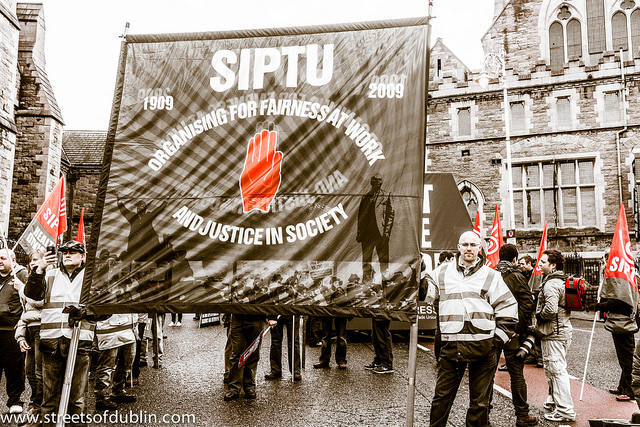A meeting last Wednesday saw agreement between members of the Services Industrial Professional and Technical Union (SIPTU) and Unite trade unions to campaign in opposition to College hiring and promotion policies, with a ballot on industrial action by Trinity’s service and support staff being among the options considered. Union members are opposed to the cessation of promotions among non-academic staff, and the phasing out of permanent jobs in favour of medium-term contracts between 3 and 7 years.
The workers represented by Unite and SIPTU include cleaners, security guards, maintenance, tourism, and library staff.
In an email to Trinity News, Unite shop steward Cieran Perry said that the meeting saw a high turnout, and ended in agreement to oppose what Perry referred to as a “management diktat” around HR policy. Section Committee Organiser of SIPTU in Trinity, Jack McGinley, said that the meeting had to be moved to a 198-seat lecture theatre which was filled to capacity, due to strong interest.
At the meeting, which SIPTU and Unite held together, staff were angry with the “lack of respect shown to staff and our representatives” over recent years, according to Perry. In a phone interview Perry said that the freeze on promotions, along with the changes in the nature of contracts, has been going on for some time but was only officially communicated to union representatives in a meeting with HR before Christmas.
Jack McGinley said that many workers in Trinity are unhappy with the degradation of employment conditions in recent years, and that there appeared to be a certain amount of appetite for industrial action. “An awful lot of the people here who came in the last 10 years; they’re on lesser pay, they’re on lesser conditions, they have worse holidays, they have a worse pension scheme, they have worse sick leave conditions, and in many cases they don’t have full hours,” he said.
McGinley also referred to plans to institute a management-led employee evaluation scheme, which is referred to in the Landsdowne Road Agreement, which a vote at the meeting on Wednesday unanimously opposed. “Some people will probably get promoted, but an awful lot of other people will leave themselves open to be queried… it could be a very slippery slope,” he said.
Perry referred to a staff morale survey carried out by Unite before the Christmas break, which showed both morale and trust in College management to be at extraordinarily low levels among support and service staff.
McGinley said that union members were aware of the impact any potential industrial action could have on students, saying it would be necessary to see “who are you going to discommode, are you going to hurt the people who need to be hurt, or is there going to be collateral damage; all that has to be weighed up.”
Meetings between different groups of union members are expected in the coming weeks, before another general meeting on February 14th. “In the next two weeks, we’ll begin putting some kind of plan of action together,” said Perry.
McGinley said that “the reality will be whether people have the stomach to take either strike action or industrial action, or else people will decide they don’t want to take any action – they’re realistically the three propositions that will be in the melting pot.”
At the time of publishing, College has yet to to provide comment. This article will be updated when comment is available.







